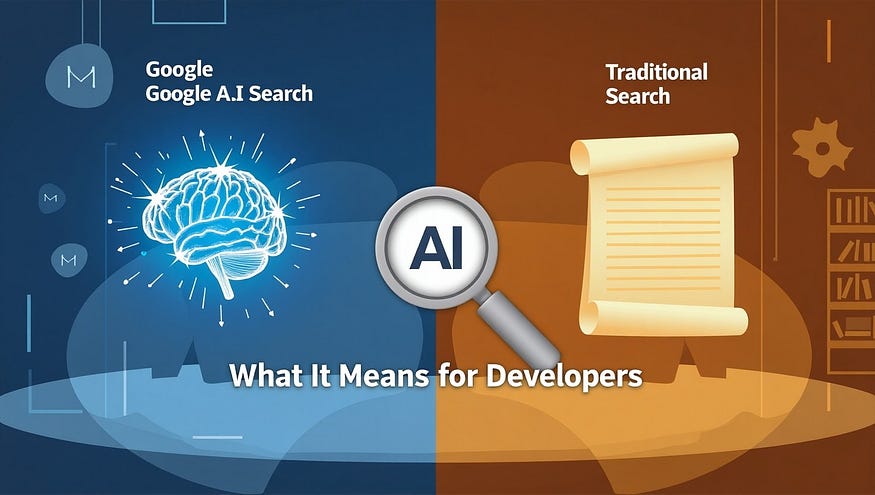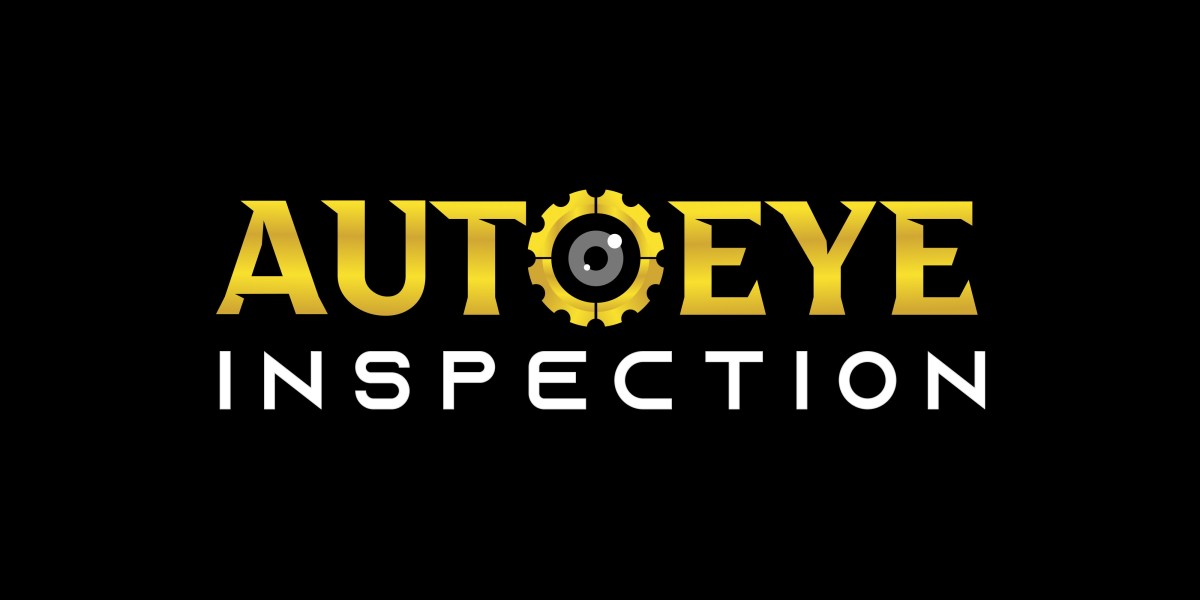
The way we search for information online is no longer what it used to be. Gone are the days when typing a few keywords into a search bar simply brought up a list of links. Today, we’re entering a new era — one where artificial intelligence is reshaping how search engines understand, process, and respond to our queries.
At the forefront of this transformation is Google AI Search — a powerful evolution that’s making search more conversational, contextual, and intuitive. It’s not just about retrieving results anymore; it’s about delivering meaningful answers, summaries, and insights in real time.
So how does this new AI-powered approach compare to the traditional search methods we’ve relied on for decades? And what does this rapid shift mean for developers, especially those working in web development and digital product spaces?
To truly grasp the implications, we need to explore how Google AI Search works, how it’s redefining the developer’s role, and what steps professionals can take to stay relevant in this fast-moving digital age.
In this blog, we’ll break down the core differences between Google AI Search and traditional search methods, explore how these changes are shaping the future of development, and share practical steps that businesses and developers can take to stay ahead in this fast-moving, AI-driven era.
What Is Google AI Search?
Google AI Search refers to the enhanced search experience powered by artificial intelligence, including technologies like machine learning, natural language processing (NLP), and generative AI. This new generation of search doesn’t just retrieve links — it understands context, summarizes information, and often provides direct answers instead of merely listing web pages.
At the core of this evolution is Google’s Search Generative Experience (SGE). Launched as part of Google’s experimentation with generative AI, SGE is designed to offer smarter, more conversational, and nuanced responses to user queries.
Instead of relying purely on keyword matching, Google AI Search evaluates intent, understands the relationship between concepts, and delivers responses tailored to the user’s query with near-human reasoning.
How Is Traditional Search Different?
Traditional search — the one most users have grown up with — works on a relatively straightforward model. It scans through indexed pages based on keyword relevance, page ranking, backlinks, and a variety of search engine optimization (SEO) signals. The results are typically ten blue links pointing to pages Google thinks best match your query.
This model has served the digital world well for decades. It was predictable, link-focused, and offered opportunities for businesses and developers to optimize content for visibility through on-page and technical SEO.
However, traditional search is limited in how it handles context, ambiguity, or complex queries. It leans heavily on how a question is phrased, often requiring users to refine their queries or dig through multiple links to find an answer.
What Makes Google AI Search More Powerful?
The most striking difference is that AI-powered search aims to deliver answers, not just sources. Here’s how:
- Contextual Understanding: AI interprets the user’s query more like a human would. For example, if someone searches “best framework for scalable web app in 2025,” AI can analyze current trends, compare multiple frameworks, and offer a summary — not just links.
- Personalization: Google AI is capable of tailoring responses based on a user’s preferences, past search behavior, and geographical location. This means developers must start thinking beyond one-size-fits-all content.
- Interactive Answers: The AI-powered interface allows users to ask follow-up questions within the same conversation. It mimics a chatbot-like experience where users drill deeper into a topic.
- Fewer Clicks, More Insights: Since many answers are given right in the search results (often called “zero-click searches”), developers must work smarter to earn visibility and engagement through structured content and schema markup.
Why Should Developers Pay Attention to This Shift?
For web developers and content creators, this change is more than just cosmetic. It influences how websites should be designed, developed, and optimized. Here’s what developers need to keep in mind:
1. Structured Data Is More Important Than Ever
With AI pulling answers directly into the search results, the use of structured data (schema markup) becomes crucial. Developers must ensure that their websites provide information in a format that search engines can easily interpret and repurpose.
2. Voice and Conversational Queries Are Rising
AI Search aligns closely with how people speak, not how they type. Developers must now account for natural language queries, meaning content should be more conversational, and metadata should reflect how users actually phrase questions.
3. Content Quality Beats Quantity
In the age of AI search, quality and relevance trump keyword stuffing. Developers collaborating with content teams should prioritize user intent, ensuring that answers are accurate, concise, and well-structured.
4. Performance Still Matters
Even with AI summarizing information, the user may still visit a site to dive deeper. A fast-loading, mobile-optimized, and accessible website remains critical. Web developers should continue optimizing Core Web Vitals and overall user experience.
What New Opportunities Does Google AI Search Create?
While the idea of users not clicking through to websites may seem alarming, AI search introduces new avenues for visibility and innovation.
Smarter Featured Snippets
AI often uses content from top-ranking pages to generate summaries. Developers can aim for rich snippet eligibility by formatting content using bullet points, subheadings, and answering FAQs directly.
AI-Ready Applications
Developers can also begin building AI-integrated search experiences into their own platforms using tools like Google Cloud’s Vertex AI, enabling smarter internal search functions on websites and apps.
Relevance of Web Development Services
This shift means businesses will rely more on professional web development services to stay competitive. Developers need to future-proof websites by aligning with Google’s AI-driven search principles and technologies.
How Should Developers Adapt Their SEO Strategies?
Developers working alongside SEO professionals must rethink their approach. Here’s how:
- Focus on Entity-Based SEO: Rather than chasing keywords, align your content and structure around entities and concepts Google understands.
- Use AI Tools for SEO Optimization: AI-driven SEO tools can now help developers analyze gaps, suggest content improvements, and optimize metadata for natural language queries.
- Enhance UX and Semantic HTML: Using semantic tags like <article>, <section>, <header> helps AI interpret content better. A solid UI/UX design aids navigation and improves time on site.
What Are the Challenges of AI Search for Developers?
Like any disruptive technology, AI Search introduces a few development and content-related challenges:
- Reduced Organic Traffic: With answers shown directly in results, there may be fewer site visits. Developers must design landing pages that immediately capture interest when users do click.
- Increased Competition: Everyone wants to be the source the AI chooses. This leads to a higher bar for content quality and code structure.
- Complex Query Optimization: Long-tail conversational queries become important. Developers should help content teams structure answers that AI can parse cleanly.
How Can CodeRower Help You Navigate This Change?
CodeRower, a modern software development company, is already aligning its services with the future of AI-driven digital experiences. With a sharp focus on web development, CodeRower empowers businesses to create AI-optimized websites that are not only visually appealing but also perform exceptionally well in both traditional and AI-enhanced search engines.
Their team combines technical expertise with a deep understanding of how AI search impacts user behavior and digital strategy. From implementing semantic HTML to integrating structured data and optimizing performance, CodeRower helps businesses stay visible, relevant, and competitive in the age of intelligent search.
If you’re a business owner or developer unsure of how to adapt to Google’s AI-driven landscape, CodeRower provides the support and strategy to future-proof your digital presence.
Is This the End of Traditional Search?
Not quite. Traditional search still powers a significant portion of the web, and many users prefer exploring multiple sources rather than relying on a single AI-generated summary. That said, AI search is no longer a niche feature — it’s becoming the default experience across platforms.
Developers must view traditional and AI search not as rivals, but as complementary forces. The goal should be to build robust, flexible websites that cater to both.
What’s Next for Developers?
With the AI revolution in full swing, developers are expected to:
- Embrace continuous learning in AI, NLP, and data structures.
- Work closely with SEO teams to build AI-friendly content structures.
- Integrate AI tools and APIs into both backend and frontend applications.
- Stay agile and open to experimental search behaviors and UX trends.
Final Thoughts: How Can Developers Win in the AI Search Era?
The key is to understand user intent, focus on clarity, deliver value, and ensure your website is structured in a way that both humans and AI can understand. Developers are now at the frontlines of content discoverability, playing a bigger role than ever before in how users find and consume information.
Google AI Search is not the end of development as we know it — it’s the beginning of a more intelligent, adaptive, and user-focused digital age.
Frequently Asked Questions (FAQs)
1. What is the main difference between Google AI Search and traditional search?
Google AI Search uses artificial intelligence to understand context and deliver direct answers, while traditional search relies on keyword matching and link-based results.
2. How does AI search affect SEO strategies?
AI search shifts the focus from keyword density to content quality, context, and structured data, requiring smarter content and semantic markup.
3. Should developers worry about zero-click results with AI Search?
Yes, developers need to optimize content for rich snippets and structured formats to stay visible even when users don’t click through.
4. How can developers prepare for AI-powered searches?
By implementing schema markup, improving website performance, using semantic HTML, and aligning content with user intent.
5. Is traditional SEO still relevant to Google AI Search?
Absolutely. Traditional SEO fundamentals still matter, but they need to be enhanced with AI-aware practices for maximum visibility.







